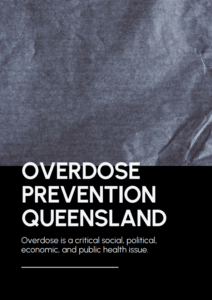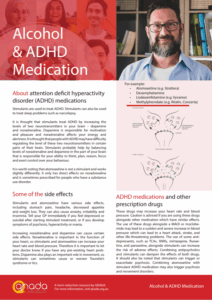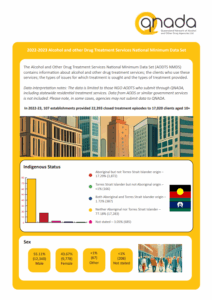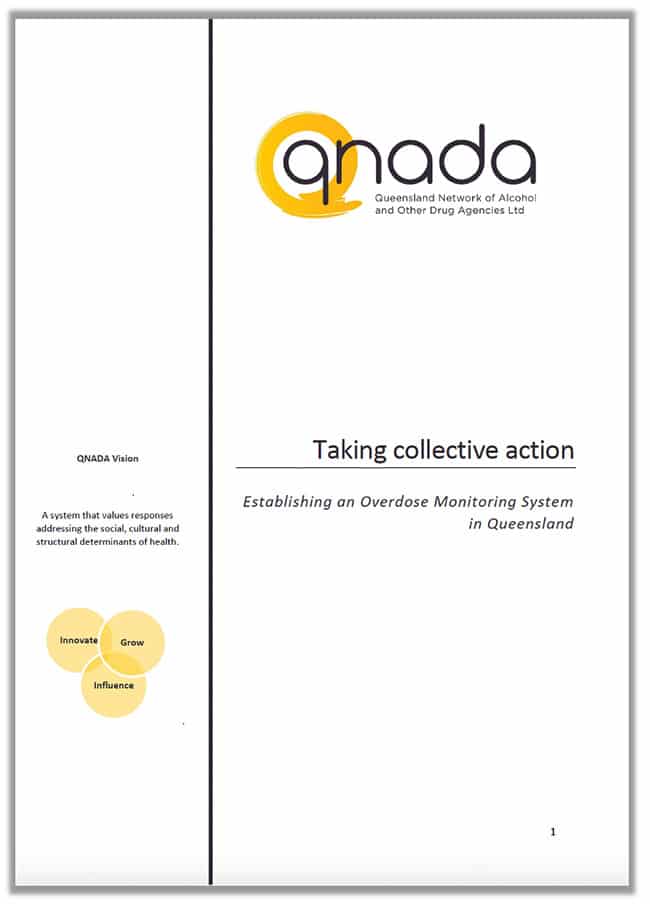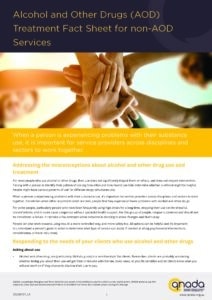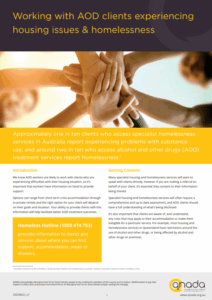News

2023-24 Alcohol and other Drug Treatment Services National Minimum Data Set
The Alcohol and Other Drug Treatment Services National Minimum Data Set (AODTS NMDS) contains information about alcohol and other drug treatment services; the clients who use these services; the types of issues for which treatment is sought and the types of treatment provided. In 2023-24, 107 establishments provided 22,104 closed treatment episodes to 13,682 clients aged 10+, a small decrease from 22,393 episodes in 2022-23.
Counselling was the most accessed treatment type (49%) followed by support and case management (18%), and rehabilitation (17%). More than half of episodes were provided to male clients (52%). Alcohol was the most common principal drug of concern for which clients sought treatment (39%), followed by methamphetamine (36%) and Cannabinoids (13%).
Data interpretation notes: The data is limited to those NGO AODTS who submit through QNADA, including statewide residential treatment services. Data from AODS or similar government services is not included. Please note, in some cases, agencies may not submit data to QNADA.
Please click here to read the full report.
Overdose Prevention Queensland Plan
Overdose is a critical social, political, economic, and public health issue.
QuIHN, QuIVAA, The Loop Australia and QNADA have established an Overdose Prevention Queensland Plan in response to the rising threat of the synthetic opioid crisis.
We are advocating for immediate action to address:
➡️ Investment and Enhancement for Harm Reduction Services
➡️Improve access to Opioid Dependence Treatment
➡️Expand drug checking services like @cheqpoint.qld
➡️0verdose Prevention Centres
➡️0verdose Response Strategies
➡️Drug and 0verdose Monitoring Systems
To read or download the full Overdose Prevention Queensland Plan, click here
Updated harm reduction resources
We recently updated our harm reduction resources.
These resources provide information on the potential interactions between commonly prescribed mental health medications and licit and illicit drugs, and were updated in collaboration with a group of practitioners across social work, psychopharmacology, addiction medicine, psychology, and public health.
Please click here or the image below to view or download the updated resources
2022-23 Alcohol and other Drug Treatment Services National Minimum Data Set
The Alcohol and Other Drug Treatment Services National Minimum Data Set (AODTS NMDS) contains information about alcohol and other drug treatment services; the clients who use these services; the type of issues for which treatment is sought and the types of treatment provided.
In 2022-2023, 107 non-government organisations and alcohol and other drug treatment establishments across Queensland submitted data to the AODTS NMDS through QNADA, including statewide residential treatment services. The submission included 22,393 closed treatment episodes to 17,020 clients aged 10+, a small increase from 21,678 episodes in 2021-2022.
Counselling was the most accessed treatment type (48%) followed by support and case management (17%), and rehabilitation (16%). More than half of episodes were provided to male clients (55%). Alcohol was the most common principal drug of concern for which clients sought treatment (36%), followed by amphetamines (32%) and Cannabinoids (14%).
Data interpretation notes: The data is limited to those NGO AODTS who submit through QNADA, including statewide residential treatment services. Data from AODS or similar government services is not included. Please note, in some cases, agencies may not submit data to QNADA.
Please click here to view or download the full 2022-23 National Minimum Data Set report
Taking collective action: Establishing an Overdose Monitoring System in Queensland
This paper provides a brief overview of the background, evidence, and opportunities for establishing an overdose monitoring system in Queensland. It has been developed by QNADA for the Queensland Mental Health Commission to explore ‘what works, when and why’ to help facilitate further stakeholder discussions and refine an agreed approach.
Please click on the image below to view or download the full paper.
2021-22 Alcohol and other Drug Treatment Services National Minimum Data Set
The Alcohol and Other Drug Treatment Services National Minimum Data Set (AODTS NMDS) contains information about alcohol and other drug treatment services; the clients who use these services; the types of issues for which treatment is sought and the types of treatment provided.
Data interpretation notes: The data is limited to those NGO AODTS who submit through QNADA, including statewide residential treatment services. Data from AODS or similar government services is not included. Please note, in some cases, agencies may not submit data to QNADA.
In 2021-22, 106 establishments provided 21,678 closed treatment episodes to 14,613 clients aged 10+
Click here for more info: 2021-22 NMDS
New policy position paper
This Systemic Responses: Child Protection position paper is the next iteration of the initial Systemic Responses position paper endorsed by the QNADA board in 2019. Our work on the Responsive Systems project since then has developed our position to be able to separately address issues in the criminal justice system, youth justice system, and child safety system as each has unique intersections with our sector and impacts people who use drugs differently. We want to do a deep dive into each of these systems and suggest how they could improve their responses to better align with evidence on what works to improve the wellbeing of individuals and communities.
Please click on the image below to read and download the full paper.
Refreshed resource – Alcohol and Other Drugs (AOD) Treatment Fact Sheet
The Alcohol and Other Drugs (AOD) Treatment Fact Sheet for non-AOD Treatment Services has recently been updated.
This fact sheet outlines and discusses some key fundamental elements of the AOD treatment and harm reduction sector. It contains information on common AOD service options, the use of non-stigmatising language, harm reduction advice, and how to make a referral to an AOD service. This resource is suitable for anyone who are new to or hasn’t worked in the AOD sector.
Please click on the image below to view or download the full fact sheet.
Working with AOD Clients Experiencing Housing Issues & Homelessness Fact Sheet
The Working with AOD Clients Experiencing Housing Issues & Homelessness Fact Sheet has recently been refreshed. We know AOD workers are likely to work with clients who may experience issues with their housing situation, so it’s important to have information on hand to provide support.
Please click on the image below to view or download the full fact sheet.
The Working with AOD Clients who Experience Mental Health Issues fact sheet has recently been refreshed
The Working with AOD Clients who Experience Mental Health Issues fact sheet has recently been refreshed.
When a person is experiencing problems with substance use, it’s important for service providers across disciplines and sectors to work together. This fact sheet is designed to provide AOD workers with foundational information and resources to support clients who are experiencing co-occurring AOD and mental health issues.
Please click on the image below to view or download the full fact sheet.
New policy position paper
This Systemic Responses: Young People and the Justice System position paper is the next iteration of the initial Systemic Responses position paper endorsed by the QNADA board in 2019. Our work on the Responsive Systems project since then has developed our position to be able to separately address issues in the criminal justice system, youth justice system, and child safety system as each has unique intersections with our sector and impacts people who use drugs differently. We want to do a deep dive into each of these systems and suggest how they could improve their responses to better align with evidence on what works to improve the wellbeing of individuals and communities.
Please click on the image below to read and download the full paper.
